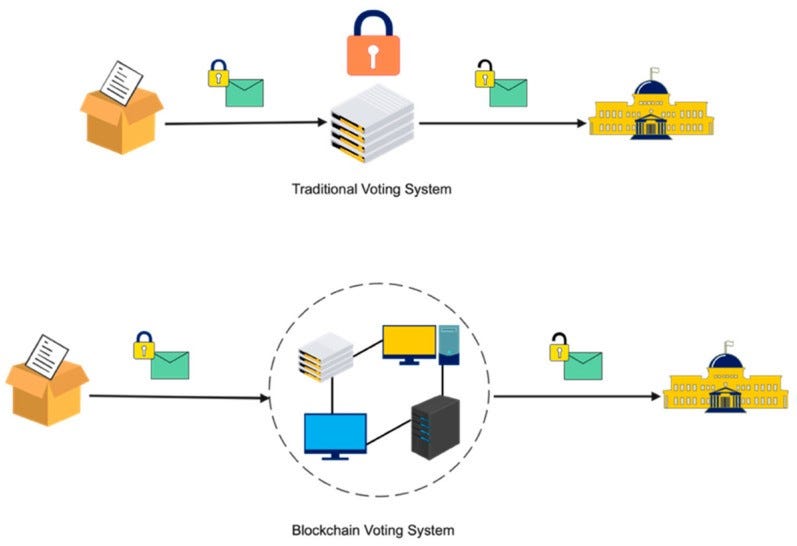Blockchain – the future technology for elections
Globally, more people than ever before will be voting in 2024 – can this historic year be made more safe and secure by blockchain?
By Pallawi Anand
2024 is the Election Year. Globally, an unprecedented number of voters will participate in elections in at least 64 countries, accounting for roughly 49% of the global population. The outcomes of these elections hold significant implications for the future trajectory of these nations and the world for years to come. Blockchain could be the key to creating and preserving electoral integrity, but the technology faces numerous hurdles to implementation.
Why electoral integrity is important
One of the cornerstones of democracy is the ability to select representatives through voting. Therefore, the integrity of these elections is crucial not only for democratic nations but also for instilling accountability among voters within states. However, the effectiveness of this process largely depends on the level of trust people have in the electoral process.
The growing conversation surrounding online voting demonstrates the opportunities it brings to reduce administrative costs and increase voter participation. By allowing voters to cast their ballots from anywhere with internet access, online voting could potentially eliminate the need for physical polling stations and paper ballots.
However, concerns exist regarding the security of online voting systems, as they may be vulnerable to manipulation. To be effective, electronic voting systems must prioritize legitimacy, accuracy, safety, and convenience. Blockchain technology offers a solution to these challenges, providing decentralized nodes for electronic voting with end-to-end verification capabilities.
How blockchain compares to traditional voting
In contrast to traditional paper-ballot-based voting systems, where voters manually mark their choices on physical paper ballots that are later counted, blockchain offers a revolutionary approach.
It functions as a distributed ledger, where every transaction, or in this case, each vote, is meticulously recorded across a network of interconnected computers. “Distributed” refers to the ledger as not being stored on a central database, but rather that each computer or node on the network stores a copy of it. This decentralized structure renders the data virtually immutable and tamper-proof. Such transparency inherently mitigates the risk of fraudulent activities, thereby safeguarding the integrity of the electoral process.
The most important property of blockchains, however, is that each new block of data requires consensus among all nodes of the network for it to be integrated with the preceding block in the chain. This feature is what ensures the transparency, uniformity, and security of the ledger.
Is blockchain applicable to all democracies?
It is unclear whether this technology can have a future in a country as large asIndia, with a population exceeding 1.4 billion. India's electoral process is nothing short of a monumental task. With over 900 million eligible voters spread across 28 states and eight union territories, and more than a million polling booths, conducting elections in India is a logistical challenge of unparalleled magnitude.
The Election Commission of India (ECI), which oversees elections, has shown interest in exploring blockchain-based solutions. However, the implementation has been limited to pilot projects and feasibility studies. One such initiative was witnessed during Telangana state's municipal elections in 2021. While the project showcased the feasibility of blockchain in enhancing electoral accessibility, widespread adoption is yet to be realized.
The limitations of blockchain
Despite the benefits of adopting blockchain, states have reason to be wary – a multitude of potential threats could undermine election integrity. Unlike traditional paper-ballot systems, online voting is prone to more extensive and harder to detect attacks, given the current state of computer security and the high stakes involved in political elections. Balancing convenience and efficiency with security is crucial for effective election systems. Notably, one of the biggest challenges that blockchain currently faces is the lack of reliable voter identification or authentication.
Implementing blockchain-based elections also requires addressing concerns about digital literacy and access to technology, particularly in rural and marginalized communities. Extensive awareness campaigns and infrastructural investments are essential to ensure the participation of every eligible voter.
Moreover, while blockchain has shown potential in addressing voting integrity, it does not tackle broader issues like political polarization and the influence of money in politics. Thus, implementing blockchain alone cannot eliminate all forms of electoral malpractices, necessitating comprehensive electoral reforms and robust enforcement mechanisms.
Furthermore, specific challenges related to blockchain technology must be considered. Scalability becomes a concern as the number of users increases during large-scale elections, leading to higher costs and time consumption. Additionally, blockchain's energy-intensive processes raise sustainability concerns, emphasizing the need for energy-efficient methods.
The future of blockchain in the electoral process
Blockchain technology for electronic voting is still in its early developmental stages. While it offers potential benefits, it cannot entirely mitigate all the flaws inherent to the voting system. Despite these challenges, the potential of blockchain to revolutionize elections cannot be understated. With ongoing advancements in blockchain scalability, security, and usability, the prospects for its widespread adoption in electoral processes are promising.
Realizing the technology’s potential requires a concerted effort from policymakers, technologists, civil society, and electoral authorities. A multi-stakeholder approach that prioritizes transparency, inclusivity, and accountability is essential in harnessing the transformative power of blockchain for fair and democratic elections across nations. By leveraging the strengths of blockchain while addressing its limitations, states can uphold the foundational principles of democracy and strengthen public trust in the electoral process.
Pallawi Anand has 6+ years of work experience & expertise in Indirect Tax Administration and Tax System implementation in the Department of Revenue, Ministry of Finance, Government of India. She has worked in a variety of fields like Goods and Service Tax, Indian Customs Department where she worked in collaboration with different stakeholders and implementation of laws originating from WTO. Pallawi is interested in learning different strategies to effectively create policy in areas of global governance.



